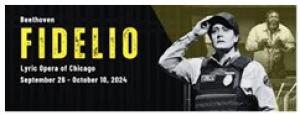
****HIGHLY RECOMMENDED**** Ludwig van Beethoven composed only one opera during his lifetime. That work was first performed at Theater an der Wien in Vienna in 1805. Beethoven, who wasn't completely satisfied with his efforts, did some major revisions and wrote several different versions for the overture of the same opera that, by 1814, became what we know today as "Fidelio." Lyric Opera of Chicago first presented "Fidelio" in November of 1961, which was the seventh season of the company's existence. It has now been over two decades since "Fidelio" has been staged at Lyric. Which makes this moment, and this particular production, the perfect time to acquaint yourself with Beethoven's only opera. 4 SPOTLIGHTS

Why is "Fidelio" so rarely produced? That's a difficult question to answer. Clearly, the music is gorgeous and the narrative is engaging -- and, at times, even riveting. However, if there is one flaw, it would be the libretto by Georg Friedrich Treitschke. Act I has moments that play almost as broadly as a rom-com only to be followed by a second act which extols the virtues of true love and the sacred power that is vested within the sacrament of marriage. If Beethoven was unhappy with Treitschke's outlook, he never attempted to correct it. Instead, he composed music that supported it. The results can be mixed and some critics complain that the natural flow of music and story can often feel like it’s moving in fits and starts. Thankfully, Lyric has a skilled director in Matthew Ozawa who has solved most of those problems. By placing the action in the Distant Past or Near Future at an undisclosed prison facility, Ozawa's production of "Fidelio" feels very relevant and, daresay, modern.

Anchoring this production of "Fidelio" is South African-born soprano Elza van den Heever as Leonore. Many opera-lovers consider the character of Leonore to be the bravest heroine in all of opera. Van den Heever makes a very strong case in favor of that fact being true. Her Leonore is a lioness, restlessly stalking the stage and defying her superiors who refuse to allow her to interact with any of the prisoners. Disguised as a man named Fidelio, Leonore has taken on this new identity so that she can work in the prison, as an assistant to the chief jailer, in an attempt to be close to and eventually free her husband Florestan.

Florestan, sung here by Russell Thomas, who has quickly become for Lyric Opera audiences one of their favorite tenors, is a freedom fighter who was unjustly imprisoned not for his crimes but by the power of his enemies. Thomas, who consistently impressed with his powerful voice in his six previous roles at Lyric, has no problem handling the complexities of the innocent and honorable Florestan. Sadly, Treitschke's libretto is constructed in such a fashion that we don't even meet the character of Florestan until the second act. As great as Thomas is, and he is sensational, it's a shame that he has such limited stage time.

Alexander V. Nichols has designed a mammoth set, a two-tiered towering steel cage which the union stagehands have nicknamed "The Cube." Placed upon a massive turntable, the set revolves 360 degrees to reveal the administrative offices of the prison, several large impersonal holding cells and even a dungeon deep below the ground in which Florestan has been enchained until he starves to death. The lighting design of Yuki Nakase Link is also highly effective.

This production of "Fidelio" contains many moments that are visually stunning. Perhaps none is more arresting than when van den Heever completes a thoroughly thrilling aria in Act I while she is positioned downstage left.
As the audience begins their applause at the conclusion of this aria, van den Heever begins to walk back onto "The Cube" as it begins its rotation. She crosses through hallways on her way to climb some stairs to the second level. Once on the second level, she continues to walk towards the edge of the set and peer out into the audience, all while the set is in motion. As the set continues to revolve, van den Heever is suddenly caught perfectly in the spotlight as she reaches the edge and holds her pose.
 In total, the moment lasts maybe 60 to 90 seconds at the most, but the deafening applause that accompanies it is a testament to the bold staging and precise timing that is required to make this trick of stagecraft work so majestically. The quiet, defiant physical gesture that ends Act I is also a very memorable image and the defining moment of this production.
In total, the moment lasts maybe 60 to 90 seconds at the most, but the deafening applause that accompanies it is a testament to the bold staging and precise timing that is required to make this trick of stagecraft work so majestically. The quiet, defiant physical gesture that ends Act I is also a very memorable image and the defining moment of this production.
____________________________________________
"Fidelio" continues until October 10, 2024
Lyric Opera of Chicago is located at 20 North Wacker Drive, Chicago, IL
Tickets: Please visit www.lyricopera.org or call 312/827-5600
Remaining performances are:
Thursday, October 10 at 7:00 PM
Running time is approximately 2 hours and 30 minutes with one intermission
